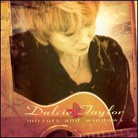April 2004
The opening song, "Blackberry Winter," distinguished by its somewhat Byrds-like electric 12-string guitar, pulls off something often achieved in traditional ballads and literature, but only occasionally in the work of such gifted contemporary songwriters as Gordon Lightfoot, Joni Mitchell, James Taylor, and the Rankins. It presents us with lyrics about weather, landscape, and animals as metaphors for human experience in a manner that isn’t forced or superficial.
The song comes into greater focus in the next few lines.
As the song develops, Taylor's shows her craft as a lyricist who is a model of succinctness and deceptive simplicity.
Taylor again shows both her lyrical sure touch and her songwriting skill in "Seaboard Train," the catchiest song on the disc. The fine background vocals by Mark Thomas might be well described as "roots rock ‘n’ roll," but that doesn’t capture the impact of the low, multi-part call-and-response-style echoing of the phrases Taylor sings in the refrain ("Won’t you carry me home (carry me home), carry me home (carry me home)"). The call-and-response, the blues-roots chord progression, and the centrality of "carry me home," as in "Swing Low, Sweet Chariot," give the song a special spiritual-gospel flavor. And in the great tradition of railroad ballads, Taylor’s harmonica in the introduction imitates an approaching train’s whistle. It takes us out at the end with the lonesome sound of a train fading into the countryside. These touches are subtle and skillful, not corny or phony. Accompanying Taylor’s harmonica opening to that one is Duke Levine’s slide guitar, providing its own train-whistle sound. Levine contributes a great deal to this album. It sounds as if he practiced the 12-string and 6-string electric, lap steel, and slide guitars for years just to record this disc. Also stellar here is Lorne Entress on drums. Sometimes talented drummers sound like they’re just putting in studio time monotonously backing up folk or country music. Entress really helps these songs communicate. Particularly striking is the rhythm he creates in "Out of My Blood," nearly identical to that of The Beatles’ "Tomorrow Never Knows" -- though the two songs could hardly be more different. Taylor’s engaging voice is equally at home in the rocking up-tempo songs, which I find the strongest, and in the slower ones, which, in the middle of the CD, cause it to drag just a little. This entire disc only includes ten songs, though, so there isn’t enough time for any one tendency of the writer-performer to take over. That’s not to say it’s a skimpy album: The briefest track lasts longer than three minutes, and most are in the range of four to five. The songs are nicely paced -- the quick ones are never rushed, nor are the slow ones burdened with dead time. From listening over and over and over to Mirrors and Windows, I am not surprised that Taylor’s first CD, Diamond & Glass (why such similar titles, I don’t know -- will the next one be Jalousies & Panes?) won a Wammie -- Washington Area Music Award -- for best contemporary folk recording. She was also a finalist in the Chris Austin songwriting Contest at Merlefest in Wilkesboro, North Carolina. On the strength of her poetry and prose writing, she was elected to the Board of Directors of the Poetry Series at the prestigious Folger Shakespeare Library, in Washington, D.C. This is an impressive series of achievements for this gifted musician. GO BACK TO: |
 Dulcie Taylor - Mirrors
and Windows
Dulcie Taylor - Mirrors
and Windows Dulcie
Taylor’s second CD, Mirrors and Windows, is striking in its variety, yet you
don’t find yourself thinking, "She’s all over the place and can’t seem
to find her voice." Instead, you figure she must be covering lots of different
people’s songs. But no -- she wrote or co-wrote every one. What we have here is a
very talented songwriter and performer.
Dulcie
Taylor’s second CD, Mirrors and Windows, is striking in its variety, yet you
don’t find yourself thinking, "She’s all over the place and can’t seem
to find her voice." Instead, you figure she must be covering lots of different
people’s songs. But no -- she wrote or co-wrote every one. What we have here is a
very talented songwriter and performer.